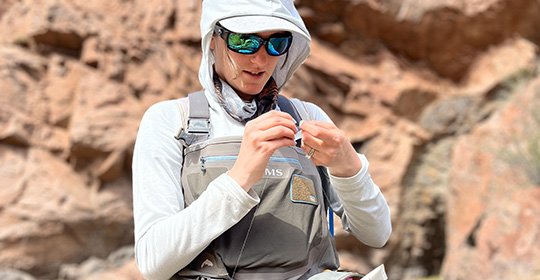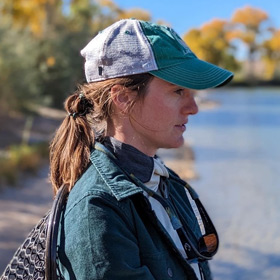Patience on the water
By Melissa Ceren LPCC, M.Ed., Ed.S.
Oct 26, 2023
Patience is a virtue in fishing when things inevitably go wrong. As you develop this skill, you may find other areas of your life that benefit from your growth in the realm of patience.
Today, I lost my patience while fly fishing for trout. Small tangles became large tangles, which built frustration while we struggled to find fish. Several times, my cast hooked into surrounding trees or my line got caught in underwater rocks as it drifted down the river. Getting stuck on these obstacles caused my rig to completely break off on a few occasions. When this happens, it takes me about 10 minutes to tie on more tippet, add weight, and tie up a rig of 3 flies–not to mention valuable time and money wasted on flies. Even worse, the fish weren't biting, even when we closely imitated the life cycles of the bugs around us. We chalked this inactivity up to a large incoming storm, but that may have explained away our poor technique on this day.
Some days are like this. That is one of the main things that fly fishing has taught me - when things do not go right, take a breath, and try again. Things will change if you allow yourself to learn and grow from failure and frustration. Patience and persistence in angling is often rewarded.

Importance of patience in fishing
When you’re in a rush on the water, it can cause you to miss out on potential opportunities for fish. Therefore, it is important to develop patience as a fishing virtue. Charging straight into the best part of a fishing hole may cause fish on the outskirts of the hole to spook and potentially scare away the rest of the fish in the hole. Instead, work the area like a grid. Cast close to yourself and then a bit further each few casts. Then, take a few steps upriver and repeat this process. This will allow you to effectively fish the entirety of the water.
In the same vein, a rushed cast will minimize your chances when sight fishing for trout. Take your time, evaluate the fish’s behavior. Is it feeding on the surface, in the water film, or subsurface? That will inform you which type of fly to have on your line, at what moment to cast during its active feeding cycle, and where to aim your flies.
Practicing patience on the water
When we try to push through frustration it usually grows and comes out in a harsh way. Thoughts of snapping your rod might even go through your head. Instead, use this tip for cultivating patience while fishing: Take a break. Look around, notice how beautiful your surroundings are and remind yourself what makes you come out here. I guarantee that this will help you to re-center so that you can make quality casts and increase your odds in the long run.









